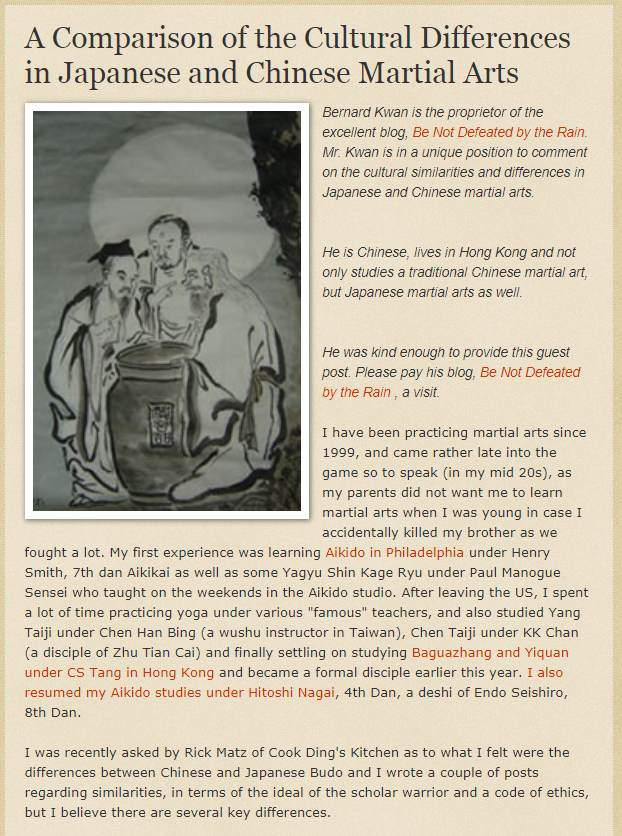Asian Martial Art study, Culture and History Comparison
/Being an avid and die hard believer in that Asian Martial Art study should include an equal emphasis on the pursuit of the cultural, historical, and some language exploration of the foundations of the country in question where the martial art originated (I hold this view, I must admit, as a minority in the Asian Martial Art community, and among my own students as well!).
So it was with some delight and great pleasure that I came upon this Blog, Be Not Afraid of the Rain, by Bernard Kwan where he compares the cultural underpinning of both Chinese and Japanese Martial Arts. I think I ran across it by a post from Rick Matz of Cook Ding’s Kitchen. Both Blogs should be of interest for martial artists to visit.
- LaoMa
A Comparison of the Cultural Differences in Japanese and Chinese Martial Arts
Bernard Kwan is the proprietor of the excellent blog, Be Not Defeated by the Rain.Mr. Kwan is in a unique position to comment on the cultural similarities and differences in Japanese and Chinese martial arts.
He is Chinese, lives in Hong Kong and not only studies a traditional Chinese martial art, but Japanese martial arts as well.
He was kind enough to provide this guest post. Please pay his blog, Be Not Defeatedby the Rain , a visit.
I have been practicing martial arts since 1999, and came rather late into the game so to speak (in my mid 20s), as my parents did not want me to learn martial arts when I was young in case I accidentally killed my brother as we fought a lot. My first experience was learning Aikido in Philadelphia under Henry Smith, 7th dan Aikikai as well as some Yagyu Shin Kage Ryu under Paul Manogue Sensei who taught on the weekends in the Aikido studio. After leaving the US, I spent a lot of time practicing yoga under various "famous" teachers, and also studied YangTaiji under Chen Han Bing (a wushu instructor in Taiwan), Chen Taiji under KK Chan (a disciple of Zhu Tian Cai) and finally settling on studying Baguazhang and Yiquan under CS Tang in Hong Kong and became a formal disciple earlier this year. I also resumed my Aikido studies under Hitoshi Nagai, 4th Dan, a deshi of Endo Seishiro, 8th Dan.
I was recently asked by Rick Matz of Cook Ding's Kitchen as to what I felt were the differences between Chinese and Japanese Budo and I wrote a couple of posts regarding similarities, in terms of the ideal of the scholar warrior and a code of ethics, but I believe there are several key differences.
1) The Individual versus the Collective
Although China has been unified for most of its history, there have been long periods of time when the country has been separated into different states.


